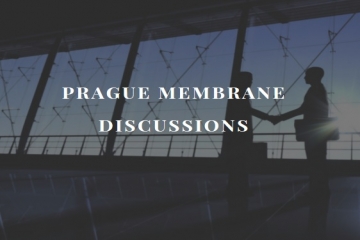
Informal discussion forum for scientists, Autumn Event: November 8th, 2018 ; 10 am - 1:30 pm
is a voluntary and informal discussion forum for scientists interested in lipid membrane related phenomena in some way. The aim is to bring together people from Prague (and well around) to foster the idea exchange, collaborations, etc. ...
Topics covered include model and cell membranes, membrane-associated molecules and processes and various techniques for membrane research. The presenters and audience range from theoretical and (bio)physical chemists to structural and molecular cell biologists. Founded and currently organised by the Cebecauer, Malínský and Stříšovský labs. We gather 3 times per year for half-day meetings of 3-5 talks and open and lively discussions peppered with tough and rigorous questions. But we are open to considering alternative formats: poster and video presentations, surveys, man-on-man discussions, hands-on practical courses or some other forms of scientific interactions in the future! :)
Autumn Event
November 8th, 2018 ; 10 am - 1:30 pm
Institute of Experimental Medicine, Videnska 1083, Prague 4
Turquoise Lecture Hall (Bldg Lb, 2nd Floor)
Final program:
10:00-11:00 Christos Gournas, Institute of Biosciences and Applications (IB-A), NCSR “Demokritos“, Athens, Greece
“Conformation-dependent control of yeast nutrient transporters: substrate-induced ubiquitylation and partitioning into starvation-protective plasma membrane domains”
Abstract:
The eukaryotic plasma membrane is compartmentalised into domains enriched in specific lipids and proteins. The best-studied domain in Saccharomyces cerevisiae is the Membrane Compartment containing the arginine permease Can1 (MCC) and later found to cluster additional transporters. MCCs correspond to static, furrow-like invaginations of the plasma membrane and associate with subcortical structures named “eisosomes” that include upstream regulators of the target of rapamycin complex 2 (TORC2) in the sensing of sphingolipids and membrane stress. However, how and why Can1 and other nutrient transporters preferentially segregate in MCCs remained up to very recently under debate. We recently reported that clustering of Can1 in MCCs is dictated by its conformation, requires proper sphingolipid biosynthesis, and controls its ubiquitin-dependent endocytosis. This presentation will focus on the molecular mechanisms by which the conformation of Can1, controls two related phenomena: 1) substrate-induced ubiquitylation and endocytosis, promoted by the Rsp5 (Nedd4) ubiquitin-ligase, recruited by α-arrestin–family adaptors, and 2) a recently described mechanism for nutrient-regulated protection from endocytosis, via partitioning in MCCs. During nutrient starvation, this protective role of MCCs is reinforced, thereby allowing cells to preserve a fraction of their nutrient transporters from bulk endocytosis (occurring in parallel with autophagy) and to more efficiently resume growth when replenishing compounds become available again.
11:00-11:20 Katarína Vaškovičová, Institute of Experimental Medicine, Czech Academy of Sciences
“Dual localization of Nce102 into sterol-enriched membrane microdomains”
11:20-11:35
Coffee break
11:35-12:15 Julien Gronnier, Laboratory of Cyril Zipfel, Institute of Plant Biology, University of Zurich, Zurich, Switzerland
“Nanoscale dynamics in plant immune signaling“
12:15-12:35 Jan Petrášek, Institute of Experimental Botany, Czech Academy of Sciences
“Heterogeneity of plasma membrane auxin carrier distribution“
12:35-13:00 Silke Kerruth, J. Heyrovský Institute of Physical Chemistry, Czech Academy of Sciences
"Sensors for neuronal activity?“
© Copyright 2018. All Rights Reserved. Stránky vytvořila agentura WebMotion.